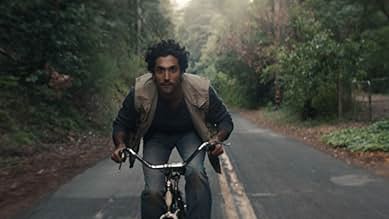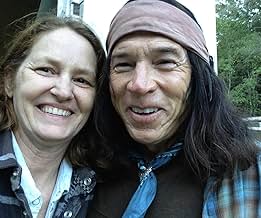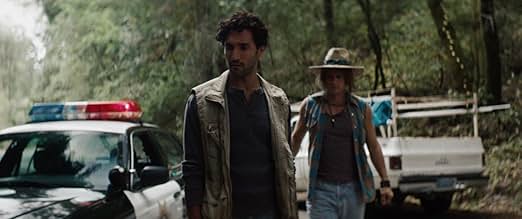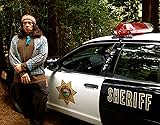A former Afghan journalist seeking asylum discovers the dark underbelly of his new small-town home in Northern California.A former Afghan journalist seeking asylum discovers the dark underbelly of his new small-town home in Northern California.A former Afghan journalist seeking asylum discovers the dark underbelly of his new small-town home in Northern California.
- Awards
- 1 win & 1 nomination total
Featured reviews
Difficult if you've seen Borat (2006) not to draw obvious comparisons, despite "Burn Country" being a human drama, profound yet also somewhat entertaining.
The character, Osman, (played by Dominic Rains) has arrived fresh from Afghanistan into small-town California, a romantic terrain of rolling mists, deserted beaches, Sequoia trees and American homesteads inhabited, it seems exclusively by white rednecks and new-age hippies.
The refugee-Afghan interpreter, journalist and "fixer" intent on using journalism in his new life sports a mustache and stubble, together with more than a touch of that endearing, unpredictable, quirky nature that got Sacha Baron-Cohen's "Borat" in such trouble with his critics. The obvious nature of Osman's recent violent war- torn past, however that led him to seek asylum on the US is reflected in events that unfold during the not-so-innocent Afghan journalist's familiarization with American backwoods life – inhabited by a community whose tribal "answers" to the problems of their often violent way of living sometimes rivals even Osman's birthplace, continents away, supposedly proving that we are, under the skin not so different from one another.
Osman, at one point purports his reason for coming to America being not the danger, but because he: "got the idea stuck in his head that life started somewhere else . like you had to get out to have a chance of really living.."
Since the justification for the journalist's asylum in America is never in doubt (with him unable to return home), the depiction of small- town America here ought make Americans feel rightly proud for welcoming a stranger so unconditionally into their close-knit tribe. Burn Country does, in a sense accentuate the need for community over city, notwithstanding its incredibly "fuzzy" attitude towards the dispensing law and order - the positive message from this movie being the power of Human Nature to eventually triumph over personal differences and other adversities.
The character, Osman, (played by Dominic Rains) has arrived fresh from Afghanistan into small-town California, a romantic terrain of rolling mists, deserted beaches, Sequoia trees and American homesteads inhabited, it seems exclusively by white rednecks and new-age hippies.
The refugee-Afghan interpreter, journalist and "fixer" intent on using journalism in his new life sports a mustache and stubble, together with more than a touch of that endearing, unpredictable, quirky nature that got Sacha Baron-Cohen's "Borat" in such trouble with his critics. The obvious nature of Osman's recent violent war- torn past, however that led him to seek asylum on the US is reflected in events that unfold during the not-so-innocent Afghan journalist's familiarization with American backwoods life – inhabited by a community whose tribal "answers" to the problems of their often violent way of living sometimes rivals even Osman's birthplace, continents away, supposedly proving that we are, under the skin not so different from one another.
Osman, at one point purports his reason for coming to America being not the danger, but because he: "got the idea stuck in his head that life started somewhere else . like you had to get out to have a chance of really living.."
Since the justification for the journalist's asylum in America is never in doubt (with him unable to return home), the depiction of small- town America here ought make Americans feel rightly proud for welcoming a stranger so unconditionally into their close-knit tribe. Burn Country does, in a sense accentuate the need for community over city, notwithstanding its incredibly "fuzzy" attitude towards the dispensing law and order - the positive message from this movie being the power of Human Nature to eventually triumph over personal differences and other adversities.
This film tells the story of an Afghan journalist, who is granted political asylum in the United States of America. He settles in a small town, living with the local policewoman. As he begins his new life and start to forge connections with others, he finds himself unknowingly in much danger.
The film has nice cinematography and lighting, but unfortunately that is about it. The story is rather poorly told, as things are not clearly explained. The relationship between Osman and the policewoman is quite confusing, as I clearly heard Osman calling the policewoman "mum" on two occasions. It is also hard to understand why Osman acted so irresponsibly, walking into danger when it is very apparent that some people are not to be messed with. Osman's persistent belief of Lindsay needing him is beyond me either, as Lindsay made no such statement, and there is no evidence to make Osman believe in that. The final scenes that happen in a weird commune is very confusing, and makes little sense. I do not understand the story at all.
The film has nice cinematography and lighting, but unfortunately that is about it. The story is rather poorly told, as things are not clearly explained. The relationship between Osman and the policewoman is quite confusing, as I clearly heard Osman calling the policewoman "mum" on two occasions. It is also hard to understand why Osman acted so irresponsibly, walking into danger when it is very apparent that some people are not to be messed with. Osman's persistent belief of Lindsay needing him is beyond me either, as Lindsay made no such statement, and there is no evidence to make Osman believe in that. The final scenes that happen in a weird commune is very confusing, and makes little sense. I do not understand the story at all.
I loved the idea of a movie highlighting the weirdness of far Northern, Coastal California. I also loved the notion the fact that our lead escaped one crazy version of human nature (Afghanistan), only to find another crazy version in California of all places.
Not that much happens. But the lead guy was mesmerizingly good in his portrayal of an awkward, deeply sensitive, almost dorky newcomer to a country and town that he doesn't understand at all.
He's so earnest in wanting to fit in and be hip. But he's in way over his head. Small rural communities have long histories, and in the case of this place, exceedingly weird ones. He hasn't been there long enough to understand the complexity. Yet you really feel for his dilemma. He wants to get a life and a profession, and do something meaningful. He's itching for it.
Melissa Leo is great as the mother of an old friend of our lead. She's an unemotional deputy sheriff, but also a mother and woman. She comes off very natural.
The opening is extremely weird, yet quite effective, because a bizarre stage play leads our main character to view it as "very free and very American." by virtue of its' weirdness.
James Franco is overexposed. I couldn't buy him as the weird town slacker, because I just kept thinking, "Oh that's just James Franco." He was probably miscast anyways.
Nevertheless, I liked it for its originality, and I don't regret watching. But beware for some violence. I could have done without it.
Not that much happens. But the lead guy was mesmerizingly good in his portrayal of an awkward, deeply sensitive, almost dorky newcomer to a country and town that he doesn't understand at all.
He's so earnest in wanting to fit in and be hip. But he's in way over his head. Small rural communities have long histories, and in the case of this place, exceedingly weird ones. He hasn't been there long enough to understand the complexity. Yet you really feel for his dilemma. He wants to get a life and a profession, and do something meaningful. He's itching for it.
Melissa Leo is great as the mother of an old friend of our lead. She's an unemotional deputy sheriff, but also a mother and woman. She comes off very natural.
The opening is extremely weird, yet quite effective, because a bizarre stage play leads our main character to view it as "very free and very American." by virtue of its' weirdness.
James Franco is overexposed. I couldn't buy him as the weird town slacker, because I just kept thinking, "Oh that's just James Franco." He was probably miscast anyways.
Nevertheless, I liked it for its originality, and I don't regret watching. But beware for some violence. I could have done without it.
The sound track is just kind of amazing, the off kilter manner of filming, and some evocative performances add to the unusual atmospheric hum. The little bit of time ive spent deep in the red woods off the beaten track north and west of cultured wine country, and other remote rural places make the setting relatable.
But then again i like off beat film far better than multplex clickbait.
But then again i like off beat film far better than multplex clickbait.
Most stupid, Insignificant.mlvie ever. Made absolutely no sense. Story line was ridiculous. Anyone who rated this movie anywhere near good is just pretending to be deep.
Did you know
- SoundtracksAnn Coulter's Poor Theater (Polish Language Version)
written by Jeff Tobias
Published by Yes Reality Music (BMI)
Courtesy of Jeff Tobias
- How long is Burn Country?Powered by Alexa
Details
- Runtime
- 1h 42m(102 min)
- Color
- Aspect ratio
- 2.39 : 1
Contribute to this page
Suggest an edit or add missing content

































